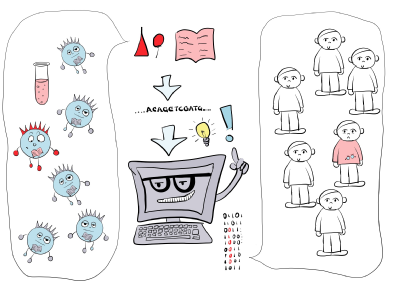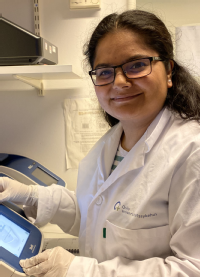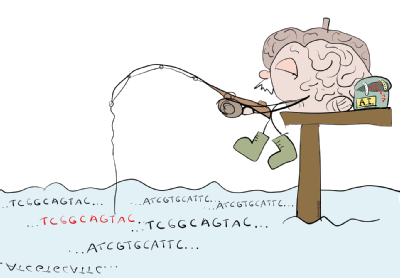Shuo-Wang, Shiva and Geir-Kjetil T cell receptors and diagnosis
Need for a diagnostic test that doesn’t require you to eat gluten
The diagnosis of coeliac disease in adult patients is based on gut damage and increased antibody levels in blood after eating gluten. Changes to the gut can only be assessed by taking a gut biopsy. If a patient is on a gluten free diet, diagnosis by this method can only be carried out after gluten is reintroduced in more than one meal per day, every day for around six weeks. Some people with coeliac disease start a gluten free diet without a proper diagnosis and are very reluctant to reintroduce gluten into their diet.
A blood test which allows diagnosis in people who have already adopted a gluten free diet is desperately needed. We believe detecting T cell receptors (TCRs) on the gluten specific T cells will provide such a test.
Gluten specific TCRs for diagnosis of coeliac disease
On Monday, Asbjørn and Louise talked about the gluten specific T cells that we believe are the main culprits of the disease. We know a lot about which gluten fragments these T cells recognise. From tetramer staining and analysis of the genes (DNA sequences), we also know what their receptors (TCRs) look like.
 Over the years, we have studied DNA sequences of the TCRs of gluten specific T cells from many people with coeliac disease. Despite the enormous diversity of TCR sequences (some claim this equals the number of grains of sand on earth!) we find several identical gluten specific TCR sequences in different individuals with coeliac disease.
Over the years, we have studied DNA sequences of the TCRs of gluten specific T cells from many people with coeliac disease. Despite the enormous diversity of TCR sequences (some claim this equals the number of grains of sand on earth!) we find several identical gluten specific TCR sequences in different individuals with coeliac disease.
In addition, we have also discovered that cells with the same gluten specific TCRs can be found in blood and gut samples taken decades apart, suggesting that these T cells are very persistent. Therefore, we believe that if we can recognise these common gluten specific TCRs in blood samples, this can be a way to diagnose coeliac disease.
We are several researchers that work together on developing such a test
 My name is Shuo-Wang Qiao. I am an Associate Professor at the Department of Immunology and a group leader in JCoDiRC. Together with my PhD students, we have performed a proof of principle study where we show that it is possible to identify coeliac disease based on sequencing TCRs.
My name is Shuo-Wang Qiao. I am an Associate Professor at the Department of Immunology and a group leader in JCoDiRC. Together with my PhD students, we have performed a proof of principle study where we show that it is possible to identify coeliac disease based on sequencing TCRs.
From a single gut biopsy, we sequence all the TCR genes that are present. We obtain thousands of TCR sequences from each biopsy. When these sequences are checked against our database of gluten specific TCR sequences, we find several hits that indicate the presence of gluten specific T cells in people with coeliac disease and close to no such sequences in healthy individuals.
Since this is a proof of principle study, we tested the approach on gut biopsies. This is because the frequency of gluten specific T cells is much higher in gut (1%) than in blood (1 per 100,000). However, the goal is to be able to diagnose coeliac disease based on a blood sample only.
 My name is Shiva Dahal-Koirala. I am a Postdoc in Ludvig Sollid’s group. My current research focuses on exploring the potential of detecting gluten specific TCRs for diagnosis from blood samples. I start with two tubes of blood (from healthy controls and or individuals with coeliac disease), isolate the memory T cells and sequence their TCR genes to obtain a large dataset of TCR sequences. We then analyse these patient and control datasets for the presence of common gluten specific TCRs.
My name is Shiva Dahal-Koirala. I am a Postdoc in Ludvig Sollid’s group. My current research focuses on exploring the potential of detecting gluten specific TCRs for diagnosis from blood samples. I start with two tubes of blood (from healthy controls and or individuals with coeliac disease), isolate the memory T cells and sequence their TCR genes to obtain a large dataset of TCR sequences. We then analyse these patient and control datasets for the presence of common gluten specific TCRs.
Our preliminary experiments have given promising results and we are able to identify people with coeliac disease separate from healthy controls in the majority of cases. We are now in the process of generating even larger TCR data sets from more individuals to explore the sensitivity and specificity of this method as a diagnostic approach.
 My name is Geir-Kjetil Sandve. I am an Associate Professor at the Department of Informatics, University of Oslo, and a group leader in JCoDiRC. Together with my team, we provide the computational skills and platforms to perform the data analysis of the large T cell receptor (TCR) datasets generated by Shiva and Shuo-Wang.
My name is Geir-Kjetil Sandve. I am an Associate Professor at the Department of Informatics, University of Oslo, and a group leader in JCoDiRC. Together with my team, we provide the computational skills and platforms to perform the data analysis of the large T cell receptor (TCR) datasets generated by Shiva and Shuo-Wang.
Patient samples are scarce and a precious resource. Experimental determination of large scale TCR sequences is costly, so it is crucial to extract as much information of diagnostic value as possible from the available data. Furthermore, it is critical that the diagnostic signals are robust and accurate for people either on a gluten containing or a gluten free diet. To achieve this, we explore a variety of methods based on artificial intelligence. Each promising approach is meticulously scrutinised to ensure that the methods discover biologically reasonable patterns that can be expected to perform robustly across application scenarios.
